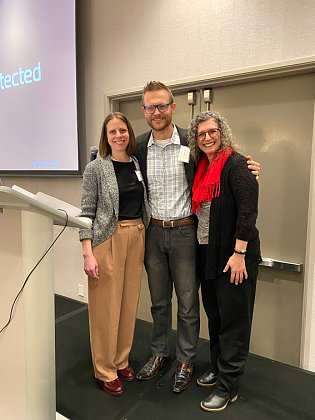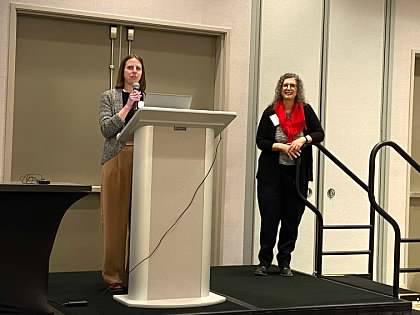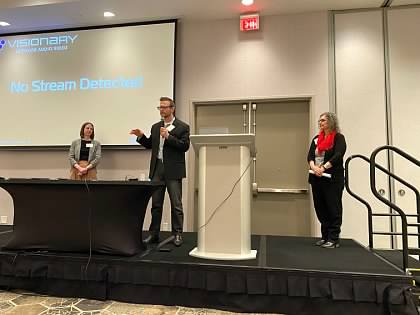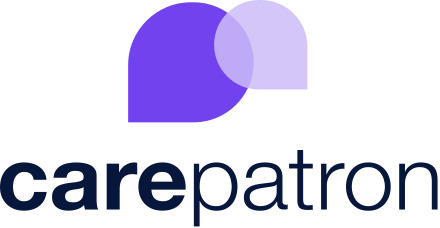Presidential Update December 2024
 Here on the last day of 2024, as my term as IPA President comes to a close, it is time to consider what we have accomplished in 2024 (or at least tried to accomplish), as well as things we may look forward to in 2025.
Here on the last day of 2024, as my term as IPA President comes to a close, it is time to consider what we have accomplished in 2024 (or at least tried to accomplish), as well as things we may look forward to in 2025.
Among our many accomplishments, perhaps most notable at this moment is the most recent, the progression with the Marketing and Rebranding efforts that started in 2023. The new IPA logo was unveiled at the Spring Conference, and the new website just went live this week. While there are content updates that are still needed, it updates and renews our public face. And it looks fantastic. In the coming year, we will also see the materials in letterhead, brochures, and other communications.
To my mind, perhaps the second most notable accomplishment has been the result of the Burton v. West Bend lawsuit. You may recall that a psychologist in the state was being compelled by a lower court to provide raw test materials and raw test results to legal counsel attempting to undermine his report. In a very short period of time, IPA mobilized by hiring legal counsel to write an amicus brief supporting 1) the Iowa Code as written (that materials can only be released to another psychologist), 2) Psychologist Ethics, and 3) test publisher contracts to resist that lower court decision. We convinced Pearson to also write an additional amicus brief from the publisher’s perspective. We coordinated with APA, who provided considerable technical, legal, ethical, and editorial support for the brief. Moreover, based on Iowa’s efforts, APA eventually agreed to reimburse IPA (and the Iowa Psychological Foundation who also provided financial support) for the full cost of the amicus brief effort. Moreover, our plight has encouraged APA to address the lack of policy in the area so as to be able to take a stronger stand in the future. (Those issues should be addressed by APA in 2025.) For anyone interested, the case will be heard by the Iowa Supreme Court on 1/21/25 at 1:30. Feel free to join in person or see it live streamed (I’ll provide a link when I find it).
Earlier this year, one of the things we worked hard on, but did not accomplish, was opposing the consolidation of the behavioral health boards into one. I’ve sat in on a couple of meetings thus far. The difficulties of the consolidation are readily apparent, as members of one profession do not appear to understand in detail the workings of the other professions. Even though it is not (yet) a fight we won, it does still demonstrate the importance of advocacy at the state level to address the needs of psychology specifically as well as mental health more generally. In the upcoming year, we anticipate there are likely to be several additional concerns we will need to address, including the recurring issues of test security (which may depend in part on the Iowa Supreme Court decision) and PsyPact.
On a more detailed level, during the year we have made revisions to IPA’s by-laws and Policy and Procedures manual. There have also been revisions to the strategic plan. Many of the revisions were meant to clarify language and simplify how we operate. Perhaps not a lot of pizzazz, but certainly important. We have offered both a spring conference (on OCD) and a fall conference (on the MMPI-3), as well as numerous smaller conferences (including topics addressing ketamine treatment, psychopharmacology, and several offerings in diversity, equity, and inclusion). IPA’s training program has advanced with increasing post-doctoral fellowships and continued growth in the Cy-Hawk pre-doctoral training program, which is moving toward hopeful APA accreditation. One of our advocacy goals for the coming year is to improve funding for those programs. In the past year we also lent support to the efforts of other states to resist the mandatory implementation of EPPP2, which has since been tabled for further discussion and development.
In addition, I want to take the opportunity to thank outgoing IPA Past President Nic Holmberg. She has presided over difficult times, and her guidance and mentorship to both myself and the overall organization have been invaluable. I am not sure how I would have managed this year without her support. I am also thankful that David VanHorn agreed to step into the IPA President Elect position. Even though we seem to have perennial problems finding volunteers for the triad position, we do seem to continually find excellent psychologists to help carry the profession forward.
In thinking about my own history of volunteering, I note that I have volunteered in some capacity every year since my senior year in high school, some years volunteering in 4 or 5 organizations at a time (for those counting, that is 40-some consecutive years). Some of those have been relatively small and time limited (e.g., helping Joppa in Des Moines clean up homeless camps for 1 day in the spring), while others have been much more time intensive (Boys Scouts for 10 years). I have volunteered for my church and with several community and professional organizations. Service is one of those values that provides “direction” in my life, contributing to a sense of meaning and community. I encourage everyone to give of themselves in acts of service, which seems to me inherent in being a psychologist, while noting that leadership positions are notably not a prestigious act we do for self-aggrandizement but rather an act of service to others. This year, we had several people respond to our calls for assistance, filling roles as IPA President Elect, IPA State Advocacy Chair, Early Career Psychologist Co-chair, and roles on the State Behavioral Health Licensing Board and the related Psychology Advisory Subcommittee of that board. If you have time and are so inclined, IPA is always looking for volunteers to improve our organization. Currently, we have open positions for Executive Council Diversity, Equity, and Inclusion Liaison and the Diversity and Social Justice committee co-chair. We also need to submit to APA a second name for the Iowa APA Representative. In addition, the IPA standing committees always welcome new members, including those who might volunteer to be a co-chair to ease the lift of our volunteers. And, of course, we will be looking for a new person to take on IPA President Elect for the fall elections. But aside from IPA, I encourage you to volunteer in whatever is meaningful to you. The world seems to need more good people in key positions.
It has been a privilege to serve as IPA President for 2024. I stepped into the role with the goal to both help maintain the organization and to move it forward, without tripping too badly. I was truly anxious about moving into that role without a “training year” as President Elect after the health-related resignation of the prior President Elect. It has been a challenge, I hope for the most part successfully navigated. But it has also been rewarding. I am excited for the continued growth of our organization. And I look forward to our continued interactions in the years to come.
Begin paid content




 In August 2023, the IPA Executive Council approved an exciting initiative to refresh IPA’s logo, branding, and website. The Marketing Consultant Workgroup began regular meetings and issued a Request for Proposal to find marketing services focused on enhancing branding and revamping the website. The project was divided into two phases: 1) redesigning the IPA logo and branding, and 2) revamping the IPA website. The workgroup envisioned the new branding to reflect IPA’s commitment to serving the mental health needs of Iowans, supporting Iowa psychologists, building networks and communities, and advocating for better mental health access and services.
In August 2023, the IPA Executive Council approved an exciting initiative to refresh IPA’s logo, branding, and website. The Marketing Consultant Workgroup began regular meetings and issued a Request for Proposal to find marketing services focused on enhancing branding and revamping the website. The project was divided into two phases: 1) redesigning the IPA logo and branding, and 2) revamping the IPA website. The workgroup envisioned the new branding to reflect IPA’s commitment to serving the mental health needs of Iowans, supporting Iowa psychologists, building networks and communities, and advocating for better mental health access and services.
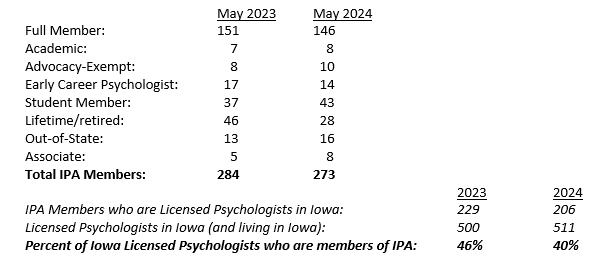
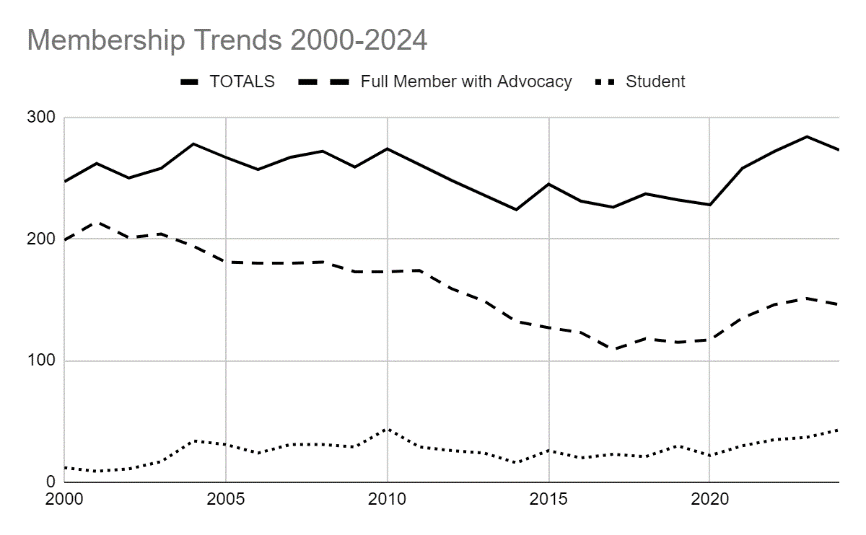

 On behalf of the Disaster Response Committee, we would like to share some information about our work over the past couple of years. Although IPA had a Disaster Response Coordinator in the past, that position had been vacant for several years prior to the formation of this committee in January 2022. When the Covid-19 pandemic hit, it highlighted the need for a committee dedicated to supporting IPA members and the Iowa public in times of crisis or disaster.
On behalf of the Disaster Response Committee, we would like to share some information about our work over the past couple of years. Although IPA had a Disaster Response Coordinator in the past, that position had been vacant for several years prior to the formation of this committee in January 2022. When the Covid-19 pandemic hit, it highlighted the need for a committee dedicated to supporting IPA members and the Iowa public in times of crisis or disaster.




